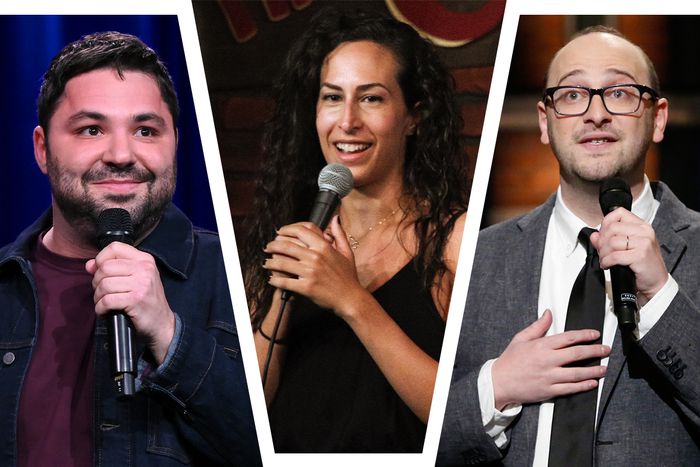
During a recent set at a New York comedy club, Geoffrey Asmus — an impish stand-up with a penchant for dark non sequitur — performed a joke about the Israel-Gaza war. Asmus began by talking about his desire to blow up obnoxious party buses. “Let’s make [this neighborhood] look like Gaza,” he said. Then, amid groans, he tagged the joke with a pair of kickers: “Sorry about that joke, you guys. My bombs are less accurate than Israel’s. That joke didn’t do great here, but it killed at a hospital down the street.” While it went over well in the room, the joke didn’t sit right with two of the lineup’s other comedians. “‘Actually, there’s human shields at the hospitals,’” he remembers one of them telling him afterward. “They were just spouting all this ‘why they had to bomb the hospital’ bullshit.”
On any given night in New York these days, audiences are liable to see a comic testing material about Israel and Palestine onstage. At Manhattan venues like the famed Comedy Cellar or New York Comedy Club, patrons might see a savvy comedy writer like Raanan Hershberg complain about how hard it is to find an “objective book” about the history of Israel (“You should not be allowed to be Jewish or Muslim and write a book about it; a Filipino needs to write a book about Israel”), or they might see a theatrical comic like Gianmarco Soresi perform his bit about talking to his less-progressive family members about the Israel-Palestine (“It makes you miss those easier-to-swallow debates, like trans women playing sports.”). At alternative comedy spaces like the Bell House in Brooklyn, regulars might see Palestinian American comedian Atheer Yacoub do her joke about being fluent in “checkpoint Hebrew” (“I have friends who are like, ‘You know, I couldn’t learn a new language if there was a gun to my head.’ — ‘You sure about that?’”), or they might catch former U.N. war-crimes lawyer Jess Salomon performing her bit about unlearning Zionism but not wanting to give up identifying as “chosen.” The “chosen people” distinction, she jokes, “is very much the ‘gifted-and-talented program’ of religion.”
While the majority of comics today don’t talk about Israel-Palestine onstage, the landscape is a far cry from the days immediately following October 7, when even the boldest comics were too wary to touch the subject. “There was ear ringing and tinnitus, and we were just kind of figuring out what people were going to say about this subject,” says Jay Jurden, a playful comedian with a kinetic, rapid-fire style. Gradually, that changed. The shock-value-dependent jokes that inevitably follow any tragedy began surfacing, and these ultimately gave way to the development of more nuanced material.
‘Good One’ Podcast
Ramy Youssef
The comedian on the first Israel-Palestine joke he wrote after 10/7.
Comedians who’d been performing jokes about Israel’s occupation of Palestine onstage long before October 7 had a head-start. Yacoub, for example, quickly got to work rejiggering a joke she’d tried previously about how Palestinians don’t experience PTSD because they’re never able to get to “the ‘post’ in ‘post-traumatic.’” She’s trying to get it to the point where it gets more laughs and fewer reactions of “aw” but says it’s equally important to her that these jokes be based in truth and humanity. Sometimes she hears laughs and wonders whether people “are laughing for the right reasons.”
Other comedians, motivated by a desire to address the mental space the conflict occupies in culture, have tried to find inventive angles that get at the topic without tackling its devastation head on. Jurden has a joke about how the most famous Palestinian American celebrity, DJ Khaled, would be a terrible spokesperson for the group’s cause (“He is dumb for Florida”). In January, Josh Gondelman did a bit about how he’s less inclined to equate antisemitism with criticism of Israel’s policies than with criticism of Adam Sandler. “If you roll up and you’re like, ‘I don’t think the Netanyahu administration has a commitment to a lasting peace process,’ I’ll hear you out,” he says. “If you’re like, ‘Sandman hasn’t made a good movie since Happy Gilmore,’ I’ll be like, ‘We don’t go to them because they’re good! We go to those movies because they’re tradition!’” The joke’s phrasing, he explains, is intentional to avoid dividing audiences: “Putting the most controversial part of it in someone else’s mouth gives me a little distance. But then I can still agree with it and go, ‘Yeah, that’s an argument I’m not offended by.”
Some Jewish and Muslim comedians say that the war has hyperpoliticized their identities in a way that has forced them to address the topic onstage. Mohanad Elshieky, for example, a wry comic who revels in pointing out double standards, has started performing a joke about the online backlash he received when he posted a plea for people to call their senators online and demand a cease-fire. “Call Hamas,” some commenters wrote back. Even this, he says, can be tricky to do onstage — particularly in “rich and touristy” areas where “people get so fucking tight” as soon as he broaches the topic. “With my name and my background, people never know where you’re going to go with it and they assume the worst.” Soresi recalls an instance at a show in New Jersey, where the only two Jewish people in attendance came up to him afterward and expressed their concern that, based on the demographic of the room, someone would interrupt the show by shouting “Free Palestine.” “My bits about my Jewish identity were suddenly seen as bits about my beliefs about Israel’s actions,” he says. He wrote his Israel-Palestine material, in part, he says, to clarify his position.
Then there are comics with staunchly pro-Israel jokes that leave less room for misinterpretation. During a set at the New York Comedy Club in March, Steve Byrne, whose act is heavy on roast-style jokes, took aim at queer pro-Palestine activists. “Go to Palestine and your pronouns will quickly be known as ‘was/were,’” he says. He adds that they’d be thrown “off the rooftops” in Palestine, a punishment complicated only by the fact that Palestine has “no more rooftops.” New York–based stand-up Modi, who was born in Tel Aviv, has a joke about donating aid to the IDF in lieu of serving in Israel’s military himself: “If Israel is looking for me, they’ve lost the war.” Meanwhile, comedians Aaron Berg, Rich Vos, and Judy Gold performed a tour titled “Stand Up for Israel,” organized by Upper West Side club Stand Up NY, designed to raise money for the nonprofit organization Friends of the IDF; its January tour stop in Toronto drew protesters.
The latter controversy speaks to the variety of political viewpoints at New York’s largest comedy clubs. In February, the Comedy Cellar hosted an “Ask an IDF Soldier” event at its Macdougal Street location; it, too, attracted protesters. (This followed a December 2023 event hosted at the Comedy Cellar that paired pro-Palestine intellectuals Cornel West and Norman Finkelstein in conversation.) In late 2023, Asmus got into a disagreement with Felicia Madison, the booker of West Side Comedy Club, over what he and others termed the anti-Muslim content of her posts online. After he reshared one of her posts and said publicly that he’d never perform at her club ever again, she texted Noam Dworman, the owner of the Comedy Cellar who discusses Israel frequently on his podcast Live From the Table, to encourage him to stop booking Asmus at his venue. Dworman hasn’t stopped booking him; instead, he had Madison and Asmus on his podcast to litigate the incident. “I don’t think it’s my business what any of my employees’ personal beliefs are,” Dworman says regarding his venue’s booking policies. He adds that if any of the comedians who perform at the Cellar are censoring their anti-Israel beliefs based on opposing beliefs he’s voiced on his podcast — onstage or online — he hasn’t seen it. “Nobody’s done great,” he says of the comics he’s witnessed doing Israel-Palestine material. “There’s so much bloodshed over there. It’s really hard to joke about it now.’”
Some comics are frustrated by their peers’ hesitation to talk about Israel-Palestine onstage, particularly those who pride themselves on pushing lines in the name of free speech. “All these people who are like, ‘I’m a comic who talks about what’s happening in the world,’ are not talking about probably the greatest moral conundrum of our time,” says Asmus. Some comedians, however, just don’t believe comedy is the right outlet for their sincere principles. As Hershberg puts it, “Saying onstage ‘I demand a cease-fire now!’ — even though that’s my belief — is not a joke.”


